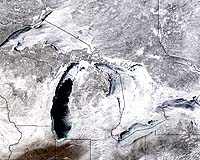
Posted on 06/01/2004 2:03:30 AM PDT by TigerLikesRooster
Prospect Of Sudden Climate Change
 |
| snap frozen in a single lifetime? |
Washington (SPX) May 31, 2004
By now, many of us have heard the ominous predictions of a possible future global apocalypse, where cataclysmic floods, tornadoes, and blizzards threaten to destroy civilization. As a consequence of climate change, the melting of polar ice supposedly could send vast quantities of fresh water into the North Atlantic's salty oceans. This torrent would work to shut down a major Atlantic Ocean current that stabilizes the Northern Hemisphere's climate system, unleashing abrupt and drastic changes to our climate.
While these forecasts are extreme, most climate experts agree that climate change is occurring now and may accelerate in the future, although not as drastic as some fiction might portray. Scientists agree that a sudden shift in our climate, such as flipping from today's slowly warming planet to an icebox is bogus and does not obey fundamental rules of physics.
Examining Climate: A Complicated Puzzle There is little doubt that the Earth has been warming, at least since 1850. In the last century alone, temperature has climbed about one degree Fahrenheit on average around the world. Sea levels have also risen by as much as eight inches because as the oceans warm, the waters expand. Larsen B, a floating ice shelf in the Antarctic, collapsed in 2002, and there is evidence that Greenland's ice sheets are melting
But, these changes are complex and brought on by several factors. Most scientists say higher temperatures are likely the result of an atmospheric increase in greenhouse gases, including carbon dioxide from burning fossil fuels such as coal and petroleum. Other human-caused factors, like changing land cover also appear to be influencing the climate.
And, finally, natural phenomena, like swings in the sun's energy and volcanic eruptions, also play a crucial role. It's important to recognize that our climate would fluctuate even without these factors since the atmosphere and oceans contain numerous gases and liquids that are constantly "sloshing" around.
Understanding the history of these factors, or "forcings," is essential for future climate predictions. "Knowing about the future means knowing about the past, how things have changed previously and why," said NASA research climatologist Gavin Schmidt.
Drastic Changes in Days?
Once considered inconceivable, recent studies have given credence to the idea that climate can change rapidly, within decades. For example, new research shows that as the world warmed at the end of the last ice age, about 13,000 years ago, melting ice sheets added enormous amounts of fresh water to the North Atlantic.
The ocean circulation system relies on the sinking of heavy, dense saltwater in the North Atlantic. But, the rapid infusion of freshwater made the surface of the ocean more buoyant. This triggered a sudden halt in the ocean's circulation system, resulting in a return to ice-age-like conditions known as the Younger Dryas.
This ocean circulation system has slowed down at least twice in the distant past. Each time, the slow down led to significant, but not disastrous cooling over the span of a few decades in parts of the world.
Although there is some evidence that North Atlantic Ocean currents and patterns of saltiness have shown recent changes consistent with these previous climate disruptions, "the time period is far too short to indicate a change in long-term circulation," says NASA oceanographer David Adamec. It will take another decade of data collection to determine whether the recently observed changes in our ocean-climate system are permanent or merely a short-lived phenomenon.
The physical makeup of the world today is also very different. Areas that once had major ice sheets are now much warmer and the amount of freshwater that could be added to the North Atlantic over the next 50 to 100 years is trivial compared to the influx seen just prior to the Younger Dryas.
Come think of it, people worry about too many things. If some Extinction Level Event (ELE) happened there is really nothing much we could do, hence why worry. It is not as if we could jump start Oceanic currents, or stop a truly huge asteroid (some of the methods proposed, such as lobbing nukes at them/attaching solar sails/burning off their surface with a laser/etc would be useless if one was seen today, since none of them is currently in any stage of implementation), and how could we induce magma flow to 'correct' a polar shift?
I am not saying that we should go out and dump light crude into our rivers and oceans and pump CFCs en masse into the atmosphere, just that people spend too much time worrying.
May I reassure you -- this is physically impossible: the angular momentum of the Earth's rotation is enormous; the polar axis cannot shift. This strange New Age belief has been around for decades without a particle of scientific plausiblity. Geologic evidence for the poles having been in different locations is now understood to be due to continental drift (plate tectonics); continents move a centimeter a year. This process is hardly abrupt or rapid.
Bring on the Ice Age! It was 100 yesterday and is supposed to be hotter today. If that's any indication of the coming summer, then I vote for another Ice Age.
Disclaimer: Opinions posted on Free Republic are those of the individual posters and do not necessarily represent the opinion of Free Republic or its management. All materials posted herein are protected by copyright law and the exemption for fair use of copyrighted works.